Peter MALONE
Saturday, 18 September 2021 19:53
Last Passenger
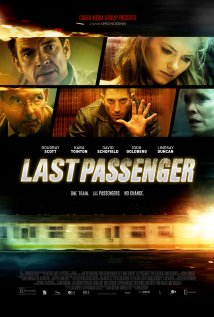
LAST PASSENGER
UK, 2013, 97 minutes, colour.
Dougray Scott, Kara Tainton, Iddo Goldberg, David Schofield, Lindsay Duncan, Joshua Kaynama.
Directed by Omid Nooshin.
Last Passenger is an unexpectedly exciting thriller, small-scale in so far as this is a train speeding through the English countryside, Hastings-bound train, passing through Tunbridge. The story is quite straightforward, establishing the characters on the train, the last passengers, the realisation of the danger, the human reactions, the plans to stop the train, to dislodge the last carriage.
It would seem that the guard on the train was killed, somebody getting on and throwing the driver from the train, the new, anonymous driver, bent on self-destruction as well as of those on the train.
The film seems to keep something of real time. The central character is a doctor, Lewis, played by Dougray Scott, who has his seven-year-old son, Max (Joshua Kaynama) with him after a day at the theatre in London. There are a number of rowdy characters, partying, who do get off the train as well as a rather snooty passenger who discounts the difficulties. By the end, there is the doctor’s son, a young woman, Sarah (Kara Toionton) who is an event manager who befriends the doctor and the boy. There is a businessman, somewhat gruff, who has previously stood his ground against a Polish Underground worker, Jan (Iddo Goldberg) who was smoking. There is also a grandmother, played by Lindsay Duncan.
The film keeps a good pace, credible with the human reactions, interesting in terms of what might be done to stop the train, the dangers, and the ultimate success.
1. An interesting disaster film, small scale, credible?
2. The title, the train, the passengers, those who got off, the remaining six, the prospect of death? The interactions? Using ingenuity?
3. The credibility of the plot, somebody taking over the train, the murder of the guard, isolating himself in the driver’s compartment, the intention of suicide? The behaviour of the passengers?
4. The scenes of the train, speeding, the attempts to get off the train, the dangers?
5. Lewis, snoozing, Max, his dinosaur toy, with the other passengers, watching? Father and son, the day at the theatre, the dead mother? Observing the other passengers? The partygoers and their getting off? Peter and his confrontation with Jan about the cigarette? The man with the computer and his disbelief? Lewis and searching for the guard, ultimately finding him? Trying to contact the driver? His concern about Max, the dangers with the opening door? The discussions with Sarah, friendliness, with Elaine? The phone calls, trying to find out what happened? His leadership? Telling Max to obey him? Jan and his attempt to get off, holding him, bring him to safety? The idea of the explosion, his setting it up, on the wrong side of the coupling? His watching, the courage, the fire, impossible to leap? His finally getting off?
6. Max, seven years old, love for his father, the day in the city, tired, not obeying his father, the open door, playing with his toys? The friendship with Sarah, their talk, playing games, even at dangerous times? Watching Jan and his magic tricks? Wanting to stay with his father, not getting off in the tunnel? Ultimately saved?
7. Sarah, Max spilling the coffee on her coat? Talk, friendship, a job, Lewis and his abilities, diagnosing her heart beat? Her talking with Max, playing the games? Encouraging Lewis? Responding to the dangers?
8. Elaine, grandmother, the toys for her grandchildren, pleasant, with Max? The strain, the attack, her death?
9. Peter, confronting Jan, the discussions, his change of heart, his own children not communicating with him, his collaboration? Phone calls? His helping Jan with the uncoupling, falling to his death?
10. The group facing death? Fighting back? Encouraging each other? the attempts to uncouple, the explosion, the final success? Lewis and his injuries, regaining consciousness? A satisfying ending?
Published in Movie Reviews
Published in
Movie Reviews
Tagged under
Saturday, 18 September 2021 19:53
You Can't Escape Forever

YOU CAN'T ESCAPE FOREVER
US, 1942, 77 minutes, Black and white.
George Brent, Brenda Marshall, Gene Lockhart, Roscoe Karns, Eduardo Ciannelli, Paul Harvey.
Directed by Joe Graham.
This is a mixture of the 1930s screwball comedy along with the very popular genre of newspapers and fast talking reporters.
It opens with a planned execution with a journalist, Laurie, a rather severe Brenda Marshall, in attendance – but she faints and misses out on the news that a pardon has been granted. But she files that the execution took place. In the meantime, managing editor, Steve Mitchell, George Brent, has taken a gamble that a pardon would be issued. The result is that Laurie is assigned to the column of advice for the lovelorn.
In the meantime, another story comes up, about a gangster who steals rations of sugar and rubber needed for the war effort. There are complications when the author of a book about corruption is killed, his wife disappears. The journalists go to a centre for the lonely where weddings are performed. Laurie Gets herself tangled with the smugglers, but Mitchell gets his story, along with his photographer, (Roscoe Karns) and a good story is prepared about the gangster, and after a car crash, he is arrested by angry Army personnel.
This is one of George Brent’s better films, in a period when he appeared in The Fighting 69th, The Old Maid and Dark Victory.
1. A slight but entertaining mixture of screwball comedy and newspaper investigation and action?
2. Warner Bros production values, black-and-white photography, the cast? For a supporting feature?
3. The execution, Laurie and her presence, upset, fainting, missing the pardon, filing the false story? The consequences, her doing the advice column? Steve and his explanation and dedication to journalism and doing the column?
4. Steve, his place in the office, Gates and his fussiness, Major Turner and responsibility for the paper? The two headlines, Steve and his twitching ear and hunches, his reaction to Laurie’s story? His love her, her refusal to be married?
5. Greer, his empire, his thugs, the visit to the office, Steve and his interview, the unflattering photo, implication of his crimes? His plans, the sugar and rubber? His connection with Robelink, using the centre, the smuggling, Robelink coming to him, wanting money, having the manuscript?
6. Steve, being demoted to the column, his great success, and fan mail?
7. The visit to the centre, the marriages, the celebrant and his enthusiasm, his book, being interviewed by Steve, giving him the book? Suspicions? The dancing? Laurie and her seeing the door, seeing the smuggling, the pursuit? Steve and his standing outside Greer’s window, hearing the discussions, confronting Robelink, finding out where the manuscript was?
8. The visit to the widow, her fortune-telling, giving the information about the manuscript?
9. Hurrying to the cemetery, the security guard laughing at the radio program, getting the information, pursued by Greer? Getting the manuscript, getting the truck, Mac and his driving, Greer and his pursuit, the range of trucks, the crash, Greer and his arrogance, the Army personnel, his arrest?
10. An entertainment, with the atmosphere of World War II?
Published in Movie Reviews
Published in
Movie Reviews
Tagged under
Saturday, 18 September 2021 19:53
Road Agent
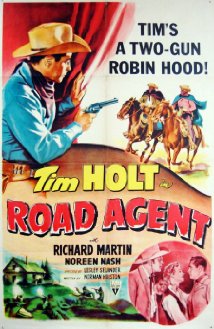
ROAD AGENT
US, 1952, 60 minutes, Black and white.
Tim Holt. Noreen Nash, Richard Martin.
Directed by Lesley Selander.
Road Agent is one of ten short Westerns made by Tim Holt in the late 1940s and 1950s. His character uses his real name. He is accompanied by a Mexican friend who is exceedingly accident-prone, played by Richard Martin.
The plot is routine but moves quickly for entertainment. Tim and his sidekick arrive at a toll road and are charged exorbitant rates. They later take back the money. On the way to the western town, they are shot at by a young woman who is defending her cattle. It appears that the local boss is imposing a toll on the road as well as the toll on all the cattle because he wants to buy them and self to dealers. The cattle ranchers have little money to pay the toll.
In town they come across their friend, Sally who sings in a saloon. The two pursue the boss, wearing cloaks and masks, and finish up with his money. They see themselves as Western Robin Hoods and deliver the money to the homesteads so that the ranchers can pay for permits to take their cattle through to sales.
In the meantime, there is a discontented worker who was fired by the boss, goes to the office and kills the manager and takes all the money. Expends the money extravagantly raising suspicions and is followed by Tim Holt and there is a siege at the house with the boss shooting the thief dead. The sheriff arrives, everything explained by Sally, and Tim and his sidekick go to help with the cattle. - and happy ending kiss.
The film is typical of its time, supporting film of the 1950s, the picture of the West where law and order still needs to be imposed and the law is that of the gun.
Published in Movie Reviews
Published in
Movie Reviews
Tagged under
Saturday, 18 September 2021 19:53
Force Majeure
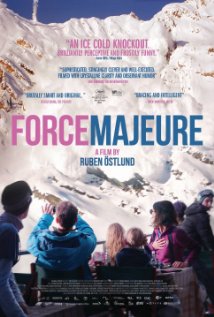
FORCE MAJEURE/TURIST
Sweden, 2014, 118 minutes, Colour,.
Johannes Kuhnke, Lisa Loven Kongsli, Clara Wettergren, Vincent Wettergren, Jakob Granqvist, Kristofer Hivju.
Directed by Ruben Ostlund.
Many of us with a smattering of romance languages might draw the quick conclusion that the title of the film means a major force, something that the trailer would seem to indicate with its scenes of an avalanche. Not at all.
The main clarification, which needs some Googling for most of us, indicates a technical meaning, a legal meaning, and a focus on responsibilities in a contract, like marriage. With this in mind, we look at a happy Swedish family who are on holidays in the Swiss Alps. It all seems very nice, no need for any worrying about force majeure. The action takes place over five days. In the early days of the holiday everyone is full of family love, affirmation of the children, going skiing, having a break from work and ordinary life…
Then comes the avalanche, not as terrifying as it looked in the trailer, rather, a different kind of avalanche but with dire consequences.
The family is at lunch with many people at the outdoor tables when the avalanche occurs – but it is a controlled avalanche, the authorities concerned about the massing of snow and having various mechanisms around the snowfields to monitor what is happening. But, as the snow advances on those who are lunching, it seems more ominous and people get to their feet, looking and wondering at what is happening; some even run away.
And that is the problem with the family. The mother stands her ground, thinking about her children. The husband, alarmed, moves away from the table. And that is his fatal move, it is the force majeure occasion in the marriage relationship. At various times, especially with groups of visitors, the husband tries to explain himself away, talk about photos, thinking about the family. His wife is in no way convinced and his behaviour and her reflection on it gnaw away at her attitude towards her husband, questioning her love for him.
This means that the film is a Swedish drama, looking intensely at characters, their external behaviour, their interior lives. The screenplay gives quite some opportunity for discussions, especially with an old friend and his very young companion, having a meal with a couple, wondering what they would do in similar circumstances.
The wife begins to keep to herself, alarming the husband, who finds himself locked out of their unit in the chalet. Realistic breaches between the couple are presented as well as symbolic, and, not giving anything away, the final scene where passengers are anxious about a bus on the mountain curves which cannot get round and people feel in danger, means an alarm for the wife and an opportunity for the husband to step forward and help.
And the question remains whether the couple will be able to regain their love in view of what has happened, whether the wife will be less severe in her demands of her husband, whether the husband will be honest in admitting what happened. When they return to Sweden, what will be the status of their marriage and how will they relate to the children?
This is a film for those who like intense Swedish dramas, and audiences who like exploration of characters in crises. The Swiss mountain scenery, of course, is very beautiful.
1. The title? Its technical meaning? Legal? Responsibilities in a contract (like marriage)?
2. A Swedish story, French settings?
3. The beautiful scenery, atmosphere? The mountains, the sky, the scheme, the lifts, the hotel on the mountains? The interiors? The room, the restaurant? The explosions? The avalanche? The musical score?
4. A holiday, the five days, audience expectations? Development of characters?
5. The members of the family, Tomas, his work, needing a holiday? Ebba and her support? Harry and Vera, actual brother and sister? The photographer, the beauty of the photos, the united family?
6. The relationships, the breakdown, crisis, handling the situations, possibilities for resolution, the meltdown, Tomas weeping, rebuilding?
7. Images illustrating the emotions? Light and happiness, the avalanche and calendars, the aftermath, hugging, the fog, screaming and weeping, skiing in the fog, trust, Ebba and her being lost, found, carried to safety? The dangers, handling them? The awkwardness on the mountain road, the bus? Tomas and his leading the group, striding out in front?
8. Happy days, skiing, the meal?
9. The experience of the avalanche, the belief that all was under control, snow coming towards the restaurant, people’s behaviour, Ebba and her holding the children, Tomas and his camera, running away? It not being an avalanche, only avalanche fog? Resuming things, the meal, normally?
10. The evening meal, the tourists, the flirtation between the man and the woman, Ebba bringing up the situation of Tomas running away, his continued denials? Her exasperation? In the room afterwards? The discussions, the cleaner and his watching? Their wanting privacy?
11. Mats, his girlfriend, on the bus, she 20, he 40? Sharing, at the meal, the response to Ebba and her story, Tomas and his denials, saying they were different perspectives, going to the bedroom with the children? Ebba wanting him to show the film on his camera? Mats, trying to help, the girl feeling awkward?
12. Mats and the girl, the argument at the lift, back in the room, his not being able to sleep, speculations about how they would handle situations? Worry? Coming down?
13. Ebba, wanting the day by herself, skiing, the effect?
14. Tomas locked out, waiting at the door, searching, phoning? His collapse? His weeping, his confession about his behaviour, seeing himself as pathetic? The cleaner letting them into the room? The children in the room, weeping, worrying about a divorce? Harry’s questions and special concern?
15. The bedroom, the children, Harry and his age, his worry about his parents, not being able to connect on the Internet? The going inside so that the parents could talk outside, Vera and her extreme petulance?
16. The many domestic sequences, in the bathroom, everybody cleaning their teeth?
17. Going skiing in the fog, trust, about being lost, Tomas leaving the children, going back for his wife, carrying her down? The rescue and his manliness again?
18. On the bus, the bad driver, Ebba and fear, the dangers, demanding to be let off, everybody getting off, the puzzle, walking down the mountain, Tomas taking the front, Mats carrying Vera, Ebba and Harry, the cigarette, striding out in leadership?
Published in Movie Reviews
Published in
Movie Reviews
Tagged under
Saturday, 18 September 2021 19:53
Interstellar
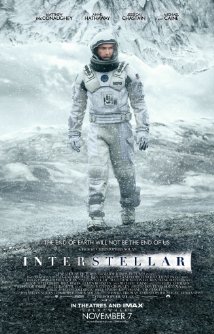
INTERSTELLAR
US, 2014, 169 minutes, Colour.
Matthew Mc Connaughey, Anne Hathaway, Jessica Chastain , Michael Caine, Matt Damon, Mackenzie Foy, John Lithgow, Bill irwin, Ellen Burstyn, Wes Bentley, David Oyelowo, William Devane, David Gyasi, Casey Affleck, Topher Grace.
Directed by Christopher Nolan.
During the last 10 years, a new film from writer-director, Christopher Nolan, has become something of an event. He has made the very successful Batman trilogy, Batman Returns, The Dark Night, The Dark Night Rises. Somewhere in there is a less well-known drama about magicians, well worth seeing, The Prestige. And in there as well is the extraordinary story of dreams and dreams within dreams, Inception. Quite a career following an initial black and white 70 minute experimental feature, Following, the now classic exploration of a character, the screenplay going from the present into the past, Memento, and the re-make of the Scandinavian police thriller with Al Pacino, Robin Williams and Hilary Swank, insomnia.
Expectations were very high for interstellar.
For Nolan fans, there is so much to relish. Interstellar is the story of a post-apocalyptic future in the United States, the collapse of the environment, crops failing, people hungry, aspects of ordinary life still functioning but grim prospects for survival. Interstellar is also the story of NASA experiments to find planets in the galaxies where humans might be able to survive. These two themes are interwoven over a period of decades, birth still battling to survive, extraordinary experiences in space.
While Inception was tantalising with the exploration of psychology, dreams, parallel worlds, Interstellar as much of the same except that the focus is very explicit on science and technology as well as imagination and dreams. It may be that some audiences will find the scientific language and detailed explanations beyond there ken and will accept them or feel overwhelmed by them. Depending on in audiences interest in space exploration and the particular mission to find other planets, this scientific perspective may be too much.
It would seem that the screenwriters, Christopher Nolan and his brother Jonathan, have been influenced by Kubrick’s 2001: A Space Odyssey of 1968. There are many similarities in the plot, especially in Kubrick’s vision of a space traveller going further and further into the future and rediscovering the past.
This is a long film, almost 3 hours, has so much to delight the eye and the year, especially in space, in the spaceship as well as in the various planets. (Some of the spectacular sequences were filmed for IMAX screening and this is a recommendation for those who want to see Interstellar, to go to the IMAX cinema.)
The success of the film also depends on audience response to Matthew Mc Conaughey. While filming this, he won an Oscar for that Best Actor in The Dallas Buyers Club. In recent years he has been in many successful dramas including Mud, The Paperboy, and filmmakers can rely on him to sustain audience interest in such a long film as this. Michael Caine, who has appeared in all of Nolan’s films in the last 10 years, is the scientist overseeing the voyage into space. His daughter, who goes on the expedition, is played by Anne Hathaway.
The screenplay posits relativity in time, travel through black holes, a year in space corresponding to many years on earth, which means that the travellers stay younger as people on earth grow older, shown in video messages to the explorers. Matthew’s precocious daughter, Murphy, who did not want her father to leave but had enabled him to make contact with NASA because of a seeming ghost or pot poltergeist in the house and series of gravity, appears in the second half of the film with Jessica Cass stain in the role.
The mission to find explorers who have gone before, leads to some exciting travel through space, some crises which are handled well, dangers on planets which are found to consist of water and enormous waves (spectacular in IMAX) or dissidents mountains (again spectacular in IMAX and filmed in Iceland). It is here that Matt Damon appears as a significant character even though he is credited for the film.
The last part of the film may be confusing or challenging, or both. It presupposes the relativity of time, time folding and unfolding back on itself, communication and lack of communication, the mysteries of time and the future.
Interstellar is a film of its time, in more senses than one. It is spectacular, thought-provoking, indeed, a cinematic achievement.
1. Impact of the film? Ambitious? Christopher Nolan and his career? Style, visual, blockbuster? Ideas? Strong cast?
2. Post-apocalyptic world? The profiles and the voices of the older women, reminiscing? The condition of the earth, crops, failure, dust storms, lack of food, broken society, homes, vehicles, work? The fatalist attitude?
3. The visuals, farms, the dust? The contrast with NASA and the vast interiors and machines? The equipment?
4. Space, the view of earth, outer space, galaxies, the black hole, travel through the hole? The planet, vast tidal wave? The ice planet and its mountains and valleys?
5. The future, the vast grid, the barrier between the future and the past? The visuals of the earth and the happy and sunny future?
6. Musical score? A variety of meanings and styles?
7. The issues of physics, astronomy, space science, space travel, computer work, robots (voice and intelligence)? Theory of black holes, time, relativity, space and time, time folding on itself? Ageing, the future influence in the past?
8. Cooper, his past experience as a pilot, Tom, Murph, his father? The household, the memory of his wife? School, visiting the teachers, the irony that the moon landing etc were considered conspiracies, the prospect of Tom and studies, staying on the farm? Murph, the bond with her father, hearing the sounds, theories of gravity, the dust, being upset, the drive across the countryside, finding the fence, guards NASA? Brand and his daughter?
9. Brand, the old professor, past contact with Cooper? His hopes for the future? His staff, the building of space ships? The expeditions, 10 years earlier, going through the holes, to planets beyond the holes? And his enthusiasm? The explanations, Coopers response? Murph and her hostile reaction?
10. Cooper and his decision to go, Brand’s daughter, and her going, the other members of the team? The robot, intelligence, visual appearance, flexible, mobile? Talking, calculating?
11. Home, his father’s influence, response? Murph and her being upset at her father abandoning them? And the prospect of the farm? The continuing messages on video news, information from earth? The passing of time, on the space ship, on earth, Romilly the crew member and his spending 23 years in isolation, his return? The crew and different ageing, reactions? the work and the difficulties with the dust, crops? Tom and his wife and family? Tom and his devotion to the farm?
12. Life on the spaceship, talks, discussions, theories, plans, exploration, the hole, going through, the effect? The 10 possibilities from the expeditions? The experience of the vast wave? The loss of Doyle? The dangers? The choices, Brand and wanting to go to find the astronaut that she loved?
13. Going to the planet finding Professor man, the Icelandic landscapes, ruggedness, snow, mountains, the difficulties in manoeuvring was to mark the exploration? The dangers? The two robots and their contribution? Man, his first words, his lies, survival, the struggle with Cooper? In the machine, Man and is being stranded, the car commands encounter commands? Cooper and the escape?
14. Brad, her character, her love for her father? Her love for the explorer? Her wanting to go to him? The contribution to the flight, theories, plans? Cooper returning, has staying?
15. Back on earth, Professor Brand and his growing older, ill, his dying, his hopes for the future, his lies and deceptions, his work with Movie, her confronting him, her reaction, his death?
16. Murph, her work, for the future, a collaboration with Grace, going to the farm, wanting Tom, his antagonism, the destruction of the crops? Urging them to leave?
17. Cooper, his return, to the past, in another dimension, behind the grid, looking at birth, hearing what he heard at the beginning, understanding her, the truth?
18. Cooper, his collapse, awaiting any in the future, the elderly birth, her life, the family, the civilisation, safety and security? His needing to adjust?
19. A satisfying exploration and imagination of the future, time and space, identity, ageing, communication, exploration?
Published in Movie Reviews
Published in
Movie Reviews
Tagged under
Saturday, 18 September 2021 19:53
Smoke Screen
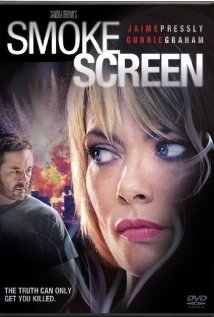
SMOKE SCREEN
US, 2010, 90 minutes, Colour.
Jaime Pressly, Currie Graham, Larissa Laskin, Blu Mankuma, Zak Santiago, Martin Cummins.
Directed by Gary Yates.
Smoke Screen is an average telemovie, interesting because of the mystery and the focus on a corrupt police force.
Crack reporter, Britt, played by Jamie Pressly, wakes to find a dead body beside her in the bed, does not remember anything, suspects that she was given a date rape drug. She reports the crime to the police, is interviewed, suspected, but she is abducted by a man who had a similar experience five years earlier and was pursued in the press by Britt. He was a fireman at the scene of the fire and was friendly with the police but set up to be shamed with the dead body. She explains the situation to him, has to listen to him, realises that she was severe on him.
The dead man was a hero in a fire in the police station five years earlier. Several of the police were praised as heroes. However, as the plot unfolds, it is revealed that the son of one of the police was of a homosexual orientation, had been bashed in a park, and the assailant, who had a record, was tortured and bashed to death – with the fire lit as a cover-up and the interrogators carrying the attacked man to safety, although they knew he was dead. The murdered man in the bed was about to reveal the truth to the reporter and so was killed.
The film focuses on one of the police, who has married a wealthy woman, is still in the power of the boss, and, it seems, also wants is to confess. When he is confronted by the two, they realise that the friend from the past, the judge who is going for re-election, was present, endorsed the cover-up, has control over the police and has thugs hired to do her murdering work.
The romance comes very early and is not quite psychologically plausible and seems intrusive at that moment in the film.
1. Television film, crime and mystery, corrupt police, murders, resolution?
2. The city setting, the police force, camaraderie, the judge due for re-election? The fire in the police precinct? Heroism? Newspapers? Television news and reporting, hounding? Cover-ups and justice?
3. The plausibility of the plot? The villain behind the cover-up and the murders? Her unmasking? Her hold over the other police? Friendships from the past? Ruthless? The final confrontation, Britt and Raley, her assistant and his distrust of her?
4. The opening, Britt, the dead body, the police, the interrogations and the detectives not believing her, the post-mortem, the drugs? The frame up?
5. Britt, reputation, everybody knowing her, meeting with Jay, the drink, waking up, the dead body, suspecting the drug, not remembering anything, the antagonism of the police? Her being abducted by Raley, his questioning her, wanting to know the truth? Her explanations, listening to him, realising that she had been played, her career based on this success? Her phoning the television station, her being put on hold for the time being?
6. Raley story, being invited to the party, the drug addict, her sexual approach, been found dead in the bed? Raley and his fiancee, not wanting him to push, leaving him? his disappearing and living alone?
7. The flashbacks to the fire, the heroism, the Fire Brigade, bringing the man out, his being dead? The cover-up of the wound to his head, his father knowing nothing about it when interrogated by Britt?
8. George, his marriage, Britt doing the research, the wealthy wife, their discussions, her knowing the truth? The research about the other police? The young Pat, his wife and family, his sexual orientation and going to the club? Britt following him?
9. The investigations, computer work, Pat getting his injury in the park, his being wounded by the aggressive homophobic man, the interrogation, the bashing, the cover-up?
10. The confrontation with Pat, his being shot in the car chase?
11. The presentation of the judge, her presence of mind, position in society? The revelation of the truth?
12. The suddenness of the romance between Britain and Raley, exploitative touches? But satisfyingly credible in the end, Raley challenging Britt about her life, her fears, ambitions, and her moving towards success?
Published in Movie Reviews
Published in
Movie Reviews
Tagged under
Saturday, 18 September 2021 19:53
Scumbus
SCUMBUS
Australia, 2012, 80 minutes, Colour.
Toby Truslove, Ed Kavalee, Samantha Tolj Glenn Robbins, Ryan Shelton, Tony Martin, Lachy Hulme.
Directed by Luke Tierney.
A slight Australian comedy, set in Sydney, focusing on the police.
This is one of those small entertainments that appear on television, with some amusing moments, with some flat moments and some oddball acting, momentarily entertaining.
Two friends, both in the police, an odd couple, very odd couple, arrive at work on the birthday of the serious one who is hoping for a promotion which does not happen. He is the Felix of this odd couple (Ed Kavalee, the writer of the screenplay). The Oscar is a would-be musician who is fairly irresponsible (Toby Truslove), cause roof mischief, even a crash into a McDonalds?. He also fancies himself as a ladies man and uses groin photos on an online dating service – which, surprisingly, does get some replies, even for a rendezvous with a sexy housewife whose husband’s interest in a threesome is watching and filming, with the revelation of the sound engineer in a cupboard. It is that kind of film.
The writer of the film, Ed Kavalee, plays the serious policeman, believing in the rules, wanting to make arrests, trying to reform his partner.
Crisis comes when they are appointed by their commander, played by Glenn Robbins, to go to the suburban police vehicle, the Scumbus. They find that the two previous officers, unwilling to go, had been dealing drugs over the years. Their contact, when he discovers the new men moved in, wants to get the drugs that are concealed there as well as the cash. He sends over a girlfriend who charms the irresponsible partner but gives an idea to the serious one to make a bust.
The serious one follows the contact after an interview with the dealer, contact his boss who wants him to let it all go. Of course, the boss is in on the plan and turns up to try to persuade them to continue the arrangement. In the meantime, a policewoman who fascinates the serious man but is connected with the officer who always gets promotions, also turns up.
A party is arranged in the scumbus to celebrate the serious man’s birthday. While he is tempted to let go, and does to a certain extent, he still wants to make the arrest. The boss organises all of this with show, making sure that the rival in promotion witnesses everything, and our hero does get a promotion.
The team also made the comedy Border Protection Squad.
Australia, 2012, 80 minutes, Colour.
Toby Truslove, Ed Kavalee, Samantha Tolj Glenn Robbins, Ryan Shelton, Tony Martin, Lachy Hulme.
Directed by Luke Tierney.
A slight Australian comedy, set in Sydney, focusing on the police.
This is one of those small entertainments that appear on television, with some amusing moments, with some flat moments and some oddball acting, momentarily entertaining.
Two friends, both in the police, an odd couple, very odd couple, arrive at work on the birthday of the serious one who is hoping for a promotion which does not happen. He is the Felix of this odd couple (Ed Kavalee, the writer of the screenplay). The Oscar is a would-be musician who is fairly irresponsible (Toby Truslove), cause roof mischief, even a crash into a McDonalds?. He also fancies himself as a ladies man and uses groin photos on an online dating service – which, surprisingly, does get some replies, even for a rendezvous with a sexy housewife whose husband’s interest in a threesome is watching and filming, with the revelation of the sound engineer in a cupboard. It is that kind of film.
The writer of the film, Ed Kavalee, plays the serious policeman, believing in the rules, wanting to make arrests, trying to reform his partner.
Crisis comes when they are appointed by their commander, played by Glenn Robbins, to go to the suburban police vehicle, the Scumbus. They find that the two previous officers, unwilling to go, had been dealing drugs over the years. Their contact, when he discovers the new men moved in, wants to get the drugs that are concealed there as well as the cash. He sends over a girlfriend who charms the irresponsible partner but gives an idea to the serious one to make a bust.
The serious one follows the contact after an interview with the dealer, contact his boss who wants him to let it all go. Of course, the boss is in on the plan and turns up to try to persuade them to continue the arrangement. In the meantime, a policewoman who fascinates the serious man but is connected with the officer who always gets promotions, also turns up.
A party is arranged in the scumbus to celebrate the serious man’s birthday. While he is tempted to let go, and does to a certain extent, he still wants to make the arrest. The boss organises all of this with show, making sure that the rival in promotion witnesses everything, and our hero does get a promotion.
The team also made the comedy Border Protection Squad.
Published in Movie Reviews
Published in
Movie Reviews
Tagged under
Saturday, 18 September 2021 19:53
Slaughter Trail
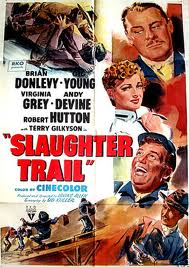
SLAUGHTER TRAIL
US, 1951, 78 minutes, Colour.
Brian Donlevy, Gig Young, Virginia Grey, Andy Devine, Robert Hutton, Terry Gilkyson.
Directed by Irving Allen.
The title, Slaughter Trail, gives the impression of being a tough western. In some senses, it is, featuring a stagecoach robbery, the death of the driver, an attack on an Indian home and the killing of two men, battles between the Navajo and the military.
However, this toughness is much lessened by the musical score and a continual use of songs. This seems anachronistic in the 21st century but there was a popularity in the 1940s for singing cowboys, especially Gene Autry. The film could be called a western musical or a musical Western, but is probably best described as a western with ballads.
While some of the songs are in the background, the screenplay provides for a military character, Singalong (Terry Gilkyson), to burst into song or to respond when asked to sing by his fellow troops. The songs have a jauntiness, often describing the action which is up there on the screen, especially the stagecoach, the outlaws, the robbery, the pursuit by the military. Other songs focus on the characters, on the humour in Fort Macy, New Mexico. There is also song for a dance at the Fort.
Gig Young is the leader of the outlaws, the Vaughan brothers, who hold up the coach, steal a purse of diamonds and entrust them to the woman passenger on the coach who turns out to be in league with them. The commander at the Fort is a rather crusty Brian Donlevy, a widower with his young daughter at the Fort. When the woman passenger wants to go on and is insulting, he forbids anyone to leave the Fort.
The complication arises when the outlaws’ horses’ ankles give way and they come upon an Indian home, shoot those who live there and steal their horses. One Indian survives and goes to the tribe, informing the chief, who had previously made a treaty of peace with the commander of the Fort. The chief demands revenge, a life for a life, while the commander tries diplomatic means, delay in the declaration of war.
The woman does persuade the commander to let her out but the coach is pursued by Indians and has to return to the Fort. In the meantime, the outlaws plan to get the diamonds allowing gig Young to go to the Fort where he also is interned because of the Indian threat.
The Indians attack – in the manner of the old-fashioned westerns, although 1950 was the year in which Broken Arrow appeared and set a different tone for depiction of Indians.
In the meantime, the woman has settled into the Fort, tries charm instead of aggression, befriends the commander’s daughter, helps with the children at the school – and, perhaps a bit quickly at times, romance, unlikely, blossoms.
It all comes to a head during the dance, the purse falling to the floor and the little girl finding it, the outlaw taking over, taking hostages. When the other men arrive, they are commandeered to help with fighting back the Indian attack. Needless to say, the three outlaws are killed – but the romance is not instantly fulfilled, the woman leaving for San Francisco - but probably returning.
Virginia Grey is the woman. And there is an amount of Fort comedy, especially about bravery and fear, from Andy Devine.
A B-feature, from its time, but entertaining on its way.
Published in Movie Reviews
Published in
Movie Reviews
Tagged under
Saturday, 18 September 2021 19:53
Doors Open
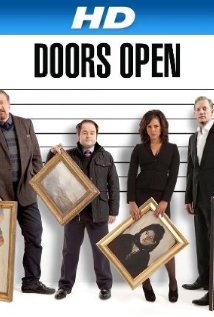
DOORS OPEN
UK, 2012, 100 minutes, Colour.
Douglas Henshall, Stephen Fry, Kenneth, Collard, Lenora Critchlow, Brian Mc Cardie, Elliot Cowan, Philip Whitchurch.
Directed by Marc Evans.
Doors Open is based on the novel by Scottish writer, Ian Rankin. Some readers have applauded the film. Others have find it a poor adaptation.
Set in Edinburgh, it is the story of a heist. Douglas Henshall is a millionaire with love of art. He is in love with Lenora Critchlow, an expert. Their friend, an art expert in Professor, is played with his usual exuberance by Stephen Fry. Kenneth Collard plays a banker, another friend of the group.
When the bank decides to offer its art collection for sale, the Professor is upset and suggests a heist with the collaboration of his friends. They realised they would need real criminal help and employ a friend of Michael with his gang – and he is in debt to a loan shark from Newcastle.
The film shows the preparations, the execution of the heist which, generally, goes smoothly, only a few moments of hiccups. But, of course, there is a twist, and the Professor is not all that he seems.
The film was directed by Marc Evans, who made such films as My Little Eye, Trauma.
1. The popularity of Ian Rankin’s novels? A satisfying adaptation?
2. The Scottish settings, Edinburgh, the city, galleries, banks, the countryside? Musical score?
3. The introduction to Robert, at the auction, his lectures, art expertise? The introduction to Michael, at the football with Alan, friends, going to the gallery, the discussions with Laura? The focus on the painting, the bidding, his buying it, a gift for Laura?
4. Five years later: Laura separated from Michael, his selling his business, bored and miserable? The bank, the inventory of the paintings, Laura in charge, her relationship with Bruce, the effect on Robert, disheartened? Alan, family difficulties, the summons by human resources, his being sacked?
5. Robert, his proposal, his motivations? Bringing Michael and Alan into the plan? Michael’s money? Alan, pessimistic, influenced by television shows and police work? The agreement, the planning?
6. The observations, the man at the gate, the cleaning van, their inability to do the job? Charlie, his money difficulties, his henchmen, the Geordie and his demands and threats, the tough and his doing the dirty work?
7. Michael, bringing Charlie into the job, his men? The planning, the disguises and Alan trying on many, Stephen Fry as a cleaner!, The van and painting it, the others going by bus?
8. Laura, meeting with Michael, the tension, two years separated, Laura’s relationship with Bruce, their work at the bank, checking the paintings? Her breaking with Bruce? His being injured during the robbery?
9. The robbery itself, most things going smoothly, Alan locking the door, Charlie getting the man to reset? The tour of the gallery? The fire alarm? The guard at the gate and his manoeuvres? Laura going in, Bruce going in?
10. The dumping of the van, getting the picture to the Geordie, the examination, its being a fake, the threats?
11. Michael, the confession to Laura, going to the house, Robert disappearing with the paintings, and also with sketches? But his leaving the favoured painting of the woman? Laura arriving at the showdown, giving the picture, ringing the police, everybody fleeing?
12. Five years later: the reconciliation between Laura and Michael, together in France, seeing the picture in the window, buying it? Robert, in Asia, his letter wishing them well, his comfort, by himself?
13. An entertaining heist film?
Published in Movie Reviews
Published in
Movie Reviews
Tagged under
Saturday, 18 September 2021 19:53
Boytown
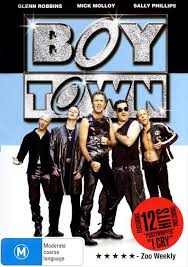
BOYTOWN
Australia, 2006, 90 minutes, Coloour.
Glenn Robbins, Mick Molloy, Lachy Hulme, Sally Phillips.
Directed by Kevin Carlin.
Here’s a how d’ye do. What is this film trying to do? On the one hand, it is a piece of Aussie nostalgia for the Boy Bands of the late 1980s and the 1990s. On the other, it is sending up the bands, the singers, the agents, the public, the songs and their lyrics (in the vein of the corniest country and western songs). This makes it sound like an either/or situation when the answer is probably a both/and.
The screenplay was written by brothers Richard and Mick Malloy and serves as a star vehicle for Mick (after several TV shows and the lawn bowls comedy, Crackerjack). It is also a star vehicle for that most durable of comedians (Fast Forward, Kath and Kim), Glenn Robbins. In fact, Robbins holds the film together.
Now happily married (to UK’s Sally Phillips), he has a yearning to reunite the band and re-live the glory days, even hoping for records and tours. He rounds up the motley group, one of whom is a lecturer on literature, another works on a building site, another stays at home with his mother and the last is a DJ beyond Woop Woop.
The plot goes according to formula – so we can enjoy following the steps we anticipate. Reluctance follows agreement, visits to the most obnoxious agent (Lachy Hulme) who has perfected the arts of two-timing and exploitation, tours, records, concerts, failure, an appeal to a middle-aged women (with songs like, It’s That Time of the Month, or Picking up the Kids from School), mix-ups in the past with strange consequences, feelings of betrayal so that the leader can go solo, truth finally outing and a feeling of achievement and contentment to finish up with.
But, it is still puzzling as to when one should feel nice and nostalgic and when one should be laughing at these silly shenanigans.
Published in Movie Reviews
Published in
Movie Reviews
Tagged under